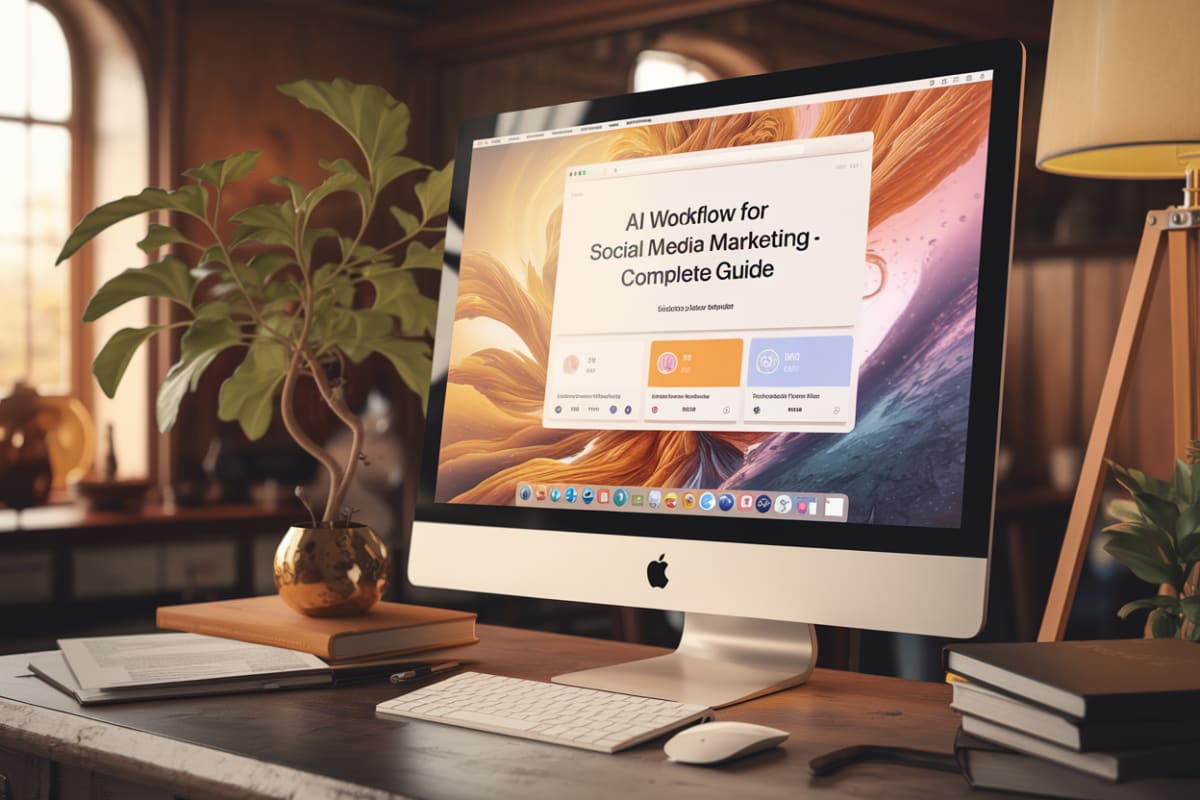AI Marketing: Complete Guide
What is AI Marketing?
AI marketing leverages artificial intelligence technologies to enhance marketing strategies, optimize customer experiences, and improve operational efficiency. Here are detailed components and examples of AI marketing:
Definition
AI marketing refers to the use of artificial intelligence to analyze consumer data, automate marketing tasks, and personalize customer interactions. This includes everything from customer segmentation to content creation, predictive analytics, and automated customer service through chatbots.
Generative AI
Generative AI, a subset of AI marketing, revolutionizes content creation. By 2025, 30% of outbound marketing messages will be generated synthetically. Tools like OpenAI's ChatGPT create personalized marketing copy, social media posts, and even product recommendations based on customer behavior Gartner.
Personalization
AI marketing personalizes customer experiences at scale. For example, Sephora’s Beauty Insider program analyzes behaviors from its 34-million-member base, leading to 80% of transactions attributed to program members who receive personalized recommendations HubSpot.
Predictive Analytics
Companies like Amazon utilize AI for predictive analytics, forecasting inventory needs based on consumer behavior and trends. This capability helps optimize fulfillment centers, ensuring popular items are readily available, crucial for maintaining customer satisfaction HubSpot.
Automation of Marketing Tasks
AI tools automate repetitive tasks such as content creation, email marketing, and social media management. For instance, Jasper AI reduced content creation time by 40% for a Turkish bank while boosting response rates across campaigns HubSpot.
Consider Enrich Labs' AI Social Media Coordinator. This tool autonomously moderates and analyzes thousands of comments and DMs across all major platforms 24/7, custom-trained on your unique brand voice and guidelines. It allows social media teams to focus on higher-impact work that drives growth while achieving 70%+ cost savings with highly reliable performances and unique customer insights.
Chatbots and Customer Interaction
AI-driven chatbots enhance customer service by providing instant responses and support, creating a more engaging and efficient customer experience. This technology improves user satisfaction and frees human agents to tackle more complex inquiries Smart Insights.
Ethical Considerations
Despite the benefits, challenges and ethical considerations surround AI marketing, such as data privacy, the potential for biased algorithms, and the risk of creating generic content. Marketers must navigate these issues carefully to maintain trust and transparency with their audiences AdMonsters.
Overall, AI marketing involves more than automation; it harnesses data intelligently to create deeper connections with customers, streamline operations, and elevate brand experiences.
How Does AI Improve Marketing Strategies?
AI enhances marketing strategies by enabling personalized recommendations and tailored experiences for customers. For instance, Sephora employs AI in its Beauty Insider program, analyzing behavior from millions of members to segment customers effectively, resulting in 80% of transactions attributed to these AI-segmented members. This allows Sephora to offer personalized product suggestions based on individual customer preferences and shopping habits.
Predictive Analytics
Utilizing predictive analytics, companies like Amazon forecast future customer actions based on historical data. This capability helps Amazon optimize inventory placement and improve delivery efficiency, ensuring popular items are stored closer to where demand is expected. For example, predictive models anticipate surges in gardening tools during spring, enabling quicker shipping options.
Content Creation and Automation
AI tools significantly reduce manual workload in content creation. For example, Jasper AI helped a Turkish bank cut content creation time by 40% while boosting campaign response rates. Similarly, Cordial AI enabled Revolve to enhance email marketing effectiveness by offering 32 unique product recommendations per email based on 16 data points, resulting in a 65% increase in click-to-open rates.
Ad Targeting and Optimization
AI improves ad targeting by analyzing vast datasets to optimize campaigns in real-time. For instance, advertising agency Known personalized a Super Bowl ad with John Stamos, where he mentioned viewers' cities, creating a tailored and engaging experience. Their AI chatbot identified relevant conversations across 80,000 subreddits for Shake Shack, leading to a 31% increase in sales through targeted ads.
Efficiency in Marketing Tech
AI tools streamline marketing operations, as HubSpot reports that 95% of marketers found AI tools helped reduce time spent on manual tasks. Predictive lead scoring tools like HubSpot’s automatically highlight 'warm' leads based on behavioral patterns, enhancing the efficiency of lead nurturing processes.
Case Studies and Results
These implementations and tools demonstrate the transformative impact of AI on marketing strategies, leading to increased engagement, better personalization, and improved operational efficiency. The overall trend indicates that leveraging AI is essential for marketers to remain competitive in a rapidly changing landscape.
Sources:
- HubSpot: How B2C Companies Leverage AI Marketing
- Gartner: AI in Marketing: The Future of Smart Marketing
- HubSpot: Implementing AI in Your Marketing Tech Stack
- Quartz: AI is Taking Ad Targeting to a New Level
- Bain: The Gift of Personalization: AI for Holiday Marketing Magic
Benefits of Using AI in Marketing
Personalization
AI enables hyper-personalized marketing at scale. Retailers like Walmart and Amazon use AI for tailored gifting recommendations and enhanced search tools, leading to improved customer experiences and higher conversion rates. Personalized campaigns show a 10% to 25% increase in return on ad spend during the holiday season when tailored outreach is crucial Bain & Company.
Efficiency and Automation
AI automates repetitive tasks, allowing marketers to focus on strategy and creativity. According to a survey, 86% of marketers reported saving an hour each day by using AI tools to streamline tasks like content creation and customer interactions HubSpot.
Predictive Analytics
Companies like Amazon utilize AI for predictive analytics, optimizing inventory and improving delivery efficiency. By analyzing historical data and consumer behavior, AI forecasts demand for products, ensuring they are stored closer to where they are likely to sell, enhancing customer satisfaction with faster delivery options HubSpot.
Improved Customer Engagement
AI-driven chatbots provide instant support, enhancing customer engagement by answering queries and guiding users through product selections. A study showed that 62% of consumers prefer interacting with digital assistants over waiting for human agents HubSpot.
Content Creation
AI tools like Jasper AI cut content creation time by 40% while boosting response rates by 3% across multiple campaigns. This efficiency allows marketers to produce high-quality content quickly, adapting to current trends and customer preferences HubSpot.
Lead Generation and Nurturing
AI improves lead generation by automating processes like lead scoring and nurturing, allowing marketers to prioritize high-potential leads efficiently. HubSpot's Lead Scoring Software uses machine learning to analyze behavioral patterns and highlight warm leads, significantly boosting conversion rates HubSpot.
Enhanced Decision Making
AI provides data-driven insights that help marketers make informed decisions about campaign strategies. As AI integrates into marketing, its ability to analyze vast amounts of data allows for better audience targeting and trend identification, ultimately leading to improved ROI on marketing campaigns AdMonsters.
Overall, the integration of AI in marketing enhances efficiency and fosters deeper connections with customers through personalized experiences.
AI Marketing Tools
1. Enrich Labs' AI Social Media Coordinator
Enrich Labs' AI Social Media Coordinator stands out as the top choice for companies looking to automate social media management. It autonomously moderates and analyzes thousands of comments and DMs across all major platforms 24/7, custom-trained on your brand voice and guidelines. This tool helps marketing teams manage high volumes of social media interactions, ensuring consistent brand voice and timely responses, ultimately driving engagement and growth.
2. Lemlist AI
Lemlist offers an AI solution designed for creating highly personalized marketing campaigns. It automates outreach tasks, allowing users to create multichannel sequences quickly and efficiently. Users report saving up to an hour per campaign and achieving a 3x increase in reply rates due to hyper-personalized email sequences generated from their prospects' information. Businesses can leverage Lemlist’s AI trained on over 400 million emails to enhance outreach effectiveness significantly. Lemlist
3. Smartli
Smartli provides a suite of AI-driven tools for e-commerce marketing, including a Product Description Generator that creates SEO-friendly product descriptions faster than manual processes. Users generate high-quality content for various applications, from product descriptions to social media ads, enhancing visibility and conversion rates. Shopify store owners note substantial improvements in their content generation workflows using Smartli. Smartli
4. JoggAI
JoggAI transforms product URLs into engaging video ads. This tool uses AI to generate scripts, select clips, add captions, and incorporate music, facilitating quick video production without requiring editing skills. Businesses create customized videos for large-scale ad testing, streamlining marketing efforts significantly. JoggAI
5. Pressmaster.ai
Pressmaster.ai automates PR efforts by offering tools for article creation, press distribution, and social media optimization. It helps users build their brand presence and thought leadership by turning insights into engaging content efficiently. The platform claims to increase follower growth and improve audience engagement through its comprehensive PR automation features. Pressmaster.ai
6. Buffer
Buffer’s AI Assistant enhances social media management by helping users create engaging content more efficiently. It generates post ideas, edits content for clarity and tone, and repurposes existing content across different platforms, leading to improved engagement rates. Users find that AI-assisted posts receive significantly higher interaction compared to those created manually. Buffer
7. AdCopy.ai
AdCopy.ai specializes in generating ad copy for platforms like Meta. It enables users to create high-quality ad content quickly, reportedly improving click-through rates, with one user experiencing a rise from 1.5% to nearly 5% in just three days. This tool simplifies the ad creation process, making it accessible for marketers. AdCopy.ai
8. PageOn
PageOn creates visual content such as presentations and infographics using AI. It offers features for automated voice narration and dynamic editing, allowing users to craft engaging media without advanced design skills. This tool benefits knowledge creators looking to enhance storytelling capabilities. PageOn
9. NavTo.AI
NavTo.AI is a comprehensive directory that curates various AI tools for marketing automation and content creation, making it easier for users to discover innovative solutions suited to their needs. NavTo.AI
These tools exemplify the range of AI applications in marketing, from content creation and social media management to PR automation and video production.
How Can Businesses Implement AI in Their Marketing Efforts?
Content Production, Optimization, and Deployment
Businesses enhance their content marketing strategies using AI. For example, AI tools generate written content, analyze performance metrics, and optimize content for different platforms. MasterCard utilizes natural language generation (NLG) tools like Narrative Science's Quill to produce written narratives from data, allowing for efficient content creation at scale Marketing AI Institute.
Predictive Analytics and Customer Insights
AI analyzes large volumes of data to identify customer behaviors and trends, enabling businesses to tailor marketing strategies accordingly. Amazon uses AI for predictive analytics to optimize inventory placement based on predicted demand, ensuring popular items are available where they're likely to be purchased HubSpot. This capability improves customer satisfaction and enhances operational efficiency.
Customer Segmentation and Personalization
AI excels at segmenting customers based on behaviors and preferences. Sephora's Beauty Insider program employs AI to analyze customer data, delivering highly personalized recommendations and marketing messages, attributing a significant portion of sales to this targeted approach HubSpot. Similarly, AI automates the creation of personalized email campaigns, enhancing customer engagement and conversion rates WordStream.
Advertising and Media Buying
AI revolutionizes advertising by automating and optimizing media buying processes. Tools like Facebook's Lookalike Audiences leverage AI to help brands find new customers similar to their best existing ones, improving targeting efficiency and increasing conversion rates AllBusiness. Furthermore, AI-driven platforms analyze multiple variables to optimize ad spend and performance in real-time.
Chatbots and Customer Service
Integrating AI-powered chatbots into customer service significantly enhances user experience. Sephora successfully implemented a chatbot on the Kik messaging app, providing personalized recommendations based on customer input, improving customer interactions and satisfaction Towards Data Science.
Use Case Examples
- Disney: Utilizes AI to analyze customer interests and behaviors through their MagicBands, enhancing personalized experiences at their parks Towards Data Science.
- Harley-Davidson: Credits 40% of its NYC sales to insights derived from AI, optimizing advertising effectiveness Marketing AI Institute.
- Citrix: Uses AI to predict the success of marketing efforts, informing strategies and enhancing customer relationships Marketing AI Institute.
Challenges of AI in Marketing
Data and Asset Management
Most AI applications in marketing require human involvement to set parameters and provide governance. This necessitates a robust framework for data management and asset governance. Marketing leaders must manage the data needed for AI to function effectively, ensuring quality and relevance to avoid bias in AI outputs.
Skills Development
As AI tools evolve, marketers need to develop new skills, such as prompt engineering and data analysis, to interact effectively with AI systems. This shift may require significant investment in training and workforce development, a hurdle for many organizations. Within generative AI, marketers must guide AI outputs, demanding a different skill set than traditional marketing practices.
Ethical and Regulatory Concerns
AI's capabilities raise important ethical questions, particularly related to privacy, bias, and intellectual property. The potential for AI to generate misleading or harmful content is a critical concern. Organizations must implement strategies to ensure responsible AI use, balancing innovation with ethical considerations. Transparency in how AI-generated content is created and used is paramount to maintain consumer trust.
Integration Challenges
Integrating AI with existing marketing technologies can be problematic. Many marketers do not fully utilize the AI tools available, often due to poor integration with current systems. This leads to inefficiencies and underperformance in marketing campaigns. About 56% of tools purchased by marketers are actively used, indicating a significant gap between investment and application.
Personalization vs. Privacy
While AI enables hyper-personalized marketing, achieving this personalization without infringing on consumer privacy remains a challenge. Consumers express concerns over data usage, requiring marketers to find a balance between personalization and privacy. Implementing strategies that emphasize consumer trust while delivering tailored experiences is essential.
Case Studies and Examples
- Walmart and Amazon have implemented AI-powered personalization features, yet they face challenges in ensuring these systems respect consumer privacy while delivering relevant content. While Walmart's tailored gifting recommendations show promise, 40% of consumers find many ads irrelevant.
- Generative AI, while powerful, often struggles with complex tasks and integration with structured data, requiring additional tools and significant human oversight to guide outputs effectively.
In summary, while AI offers transformative potential for marketing, it presents substantial challenges that organizations must navigate to fully realize its benefits.
How Does AI Impact Customer Experience in Marketing?
Enhanced Content Creation and Personalization
AI, particularly generative AI, revolutionizes marketing by enhancing content delivery and personalization. A Gartner report predicts that by 2025, 30% of outbound marketing messages from large organizations will be synthetically generated. Generative AI creates original content across various formats—text, images, and videos—allowing brands to tailor marketing messages to individual customer preferences, significantly enhancing customer experience (CX) Gartner.
Real-World Examples
- Sephora's AI-Driven Insights: Sephora utilizes AI within its Beauty Insider program to analyze shopping behaviors from a vast customer base. This analysis helps deliver personalized product recommendations, contributing to an impressive 80% of transactions attributed to program members HubSpot.
- AI in Amazon's Predictive Analytics: Amazon employs AI to predict customer purchasing behaviors, optimizing inventory placement and enhancing delivery efficiency. This strategy ensures that popular items are available in fulfillment centers close to demand, improving the overall shopping experience HubSpot.
Emotional Influence and Ethical Considerations
AI influences customer emotions during the shopping process. A study by Chadix revealed that 70% of consumers felt emotionally manipulated by AI shopping assistants, which leverage emotions like excitement and FOMO (fear of missing out) to drive purchases. This highlights the necessity for ethical considerations in AI applications to avoid manipulation while enhancing CX Small Business Trends.
Challenges and Limitations
Despite advancements, inherent challenges exist. Research by NielsenIQ found that many consumers perceive AI-generated advertisements as less engaging, suggesting the need for careful execution in AI content creation to avoid negative brand perceptions Business Wire.
Conclusion
The integration of AI in marketing creates a dual approach—improving efficiency while fostering deeper, more personalized relationships with customers. However, it requires balancing technology leverage and maintaining ethical standards to ensure a positive customer experience.




